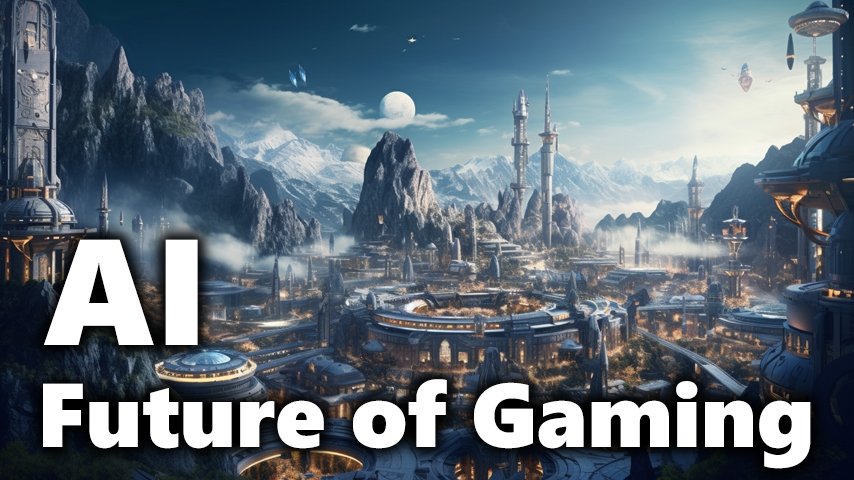In recent years, artificial intelligence (AI) has significantly transformed various industries, with the gaming sector being one of the most exciting fields of innovation. As we look ahead, the integration of AI’s future in gaming is anticipated to revolutionize the way we experience and interact with games. This blog explores the potential impacts and predictions for AI’s role in future gaming innovations. We will discuss aspects such as gaming technology advancements, augmented reality gaming, dynamic storytelling in games, and overall predictions for the gaming industry.
The Impact of AI’s future in Gaming Technology Advancements
Artificial intelligence is at the forefront of gaming technology advancements, pushing the boundaries of what games can do and how they are played. AI algorithms are being used to create more realistic game environments and smarter, more adaptive gameplay. For example, AI can generate complex game worlds that react dynamically to player actions, providing a unique experience every time the game is played. This not only enhances the player’s immersion but also extends the game’s replayability and depth.
Also, AI-driven analytics are used to monitor player behavior and preferences, allowing developers to customize experiences to individual players. This personalization is a key aspect of future gaming innovation, making games more engaging and enjoyable.
Artificial Intelligence has already made significant inroads into the gaming industry. From non-player characters (NPCs) that exhibit realistic behaviors to sophisticated game environments that adapt to players’ actions, AI is an important component in modern game design. However, the potential of AI in gaming innovation goes far beyond these current applications.
Augmented Reality Gaming: Merging Real and Virtual Worlds
One of the most anticipated developments in gaming is the fusion of augmented reality (AR) with AI. Augmented reality gaming covers digital content in the real world, creating an immersive experience that blends the physical and virtual worlds. AI can significantly enhance this experience by making AR interactions more realistic and responsive.
- Enhanced Realism and Interaction: AI can analyze real-world environments in real-time, allowing AR games to integrate seamlessly with the physical world. This means that virtual characters can interact with physical objects and environments in ways that feel natural and intuitive. For example, an AI-powered AR game could recognize and respond to changes in the player’s surroundings, such as moving objects or changes in lighting.
- Personalized Gaming Experiences: AI algorithms can track and learn from a player’s behavior and preferences, AI is creating a personalized gaming experience. This personalization can range from adjusting difficulty levels to suggesting in-game activities based on the player’s interests. In augmented reality gaming, this means that the game can adapt to how and where the player is playing, providing a unique experience tailored to each individual.
Also Read : The Impact of VR Gaming on the Gaming Industry
Dynamic Storytelling in Games: Creating Living Narratives
Storytelling is a cornerstone of many games, and AI has the potential to transform how stories are told and experienced in gaming. Dynamic storytelling in games refers to narratives that evolve based on the player’s actions and decisions, creating a unique story for each playthrough.
- Adaptive Plotlines: AI can create adaptive plotlines that change in response to the player’s choices. This means that no two playthroughs are the same, as the story evolves based on the player’s interactions and decisions. For instance, an AI could generate different dialogues, missions, and endings depending on how the player engages with the game world.
- Intelligent NPCs: Non-player characters driven by AI can exhibit more complex and believable behaviors. These intelligent NPCs can remember past interactions with the player, develop relationships, and even hold grudges or alliances based on previous encounters. This depth of interaction can make the game world feel more alive and immersive.
- Procedural Content Generation: AI can also assist in procedural content generation, creating vast and varied game worlds on the fly. This technology allows for the automatic creation of landscapes, cities, and even entire universes, offering players endless exploration opportunities. By leveraging AI, game developers can create richer, more diverse environments without the need for manually designing every element.
Gaming Technology Advancements: Shaping the Future
AI is at the heart of many gaming technology advancements, driving innovation in various aspects of game development and play.
- Improved Game Design: AI can assist game developers in designing more complex and engaging games. By analyzing player data, AI can identify which elements of a game are most engaging and which are less effective. This feedback can help developers refine their games, making them more enjoyable and immersive for players.
- Enhanced Graphics and Animations: AI-powered tools can create highly realistic graphics and animations. Machine learning algorithms can generate lifelike textures, facial expressions, and movements, bringing characters and environments to life. This level of realism can significantly enhance the player’s immersion in the game world.
- Intelligent Game Balancing: AI can monitor player performance and dynamically adjust the game’s difficulty to ensure a balanced and enjoyable experience. This intelligent game balancing can prevent frustration by making challenging sections more accessible and reducing boredom by introducing new challenges as players improve.
Predictions for the Gaming Industry: What Lies Ahead?
As AI continues to evolve, its impact on the gaming industry is expected to grow even more. Here are some key predictions for AI’s role in future gaming innovations:
1. Fully Realized Virtual Worlds: AI will enable the creation of fully realized virtual worlds that are indistinguishable from reality. These worlds will be populated by intelligent NPCs with whom players can interact naturally. This level of immersion will redefine what is possible in gaming, blurring the lines between the virtual and real worlds.
2. More Inclusive Games: AI can help create more inclusive games by adapting content to suit players of different abilities and preferences. For example, AI-driven accessibility features can modify game controls, visuals, and audio to accommodate players with disabilities, ensuring that everyone can enjoy the gaming experience.
3. Cross-Platform Integration: AI will facilitate the seamless integration of games across different platforms, allowing players to continue their gaming experience on various devices. This cross-platform integration means that a game started on a console can be continued on a mobile device or a VR headset, providing greater flexibility and continuity.
4. Deeper Emotional Engagement: AI can analyze and respond to players’ emotional states, creating games that adapt to their moods and feelings. This deeper emotional engagement can lead to more meaningful and impactful gaming experiences, where players feel genuinely connected to the game world and its characters.
5. Collaborative AI-Driven Games: Future games may feature collaborative AI-driven gameplay, where players team up with AI companions to achieve common goals. These AI companions will be able to understand and adapt to players’ strategies, providing valuable support and enhancing the cooperative gaming experience.
Conclusion
AI’s gaming innovation is closely tied to the advancements in AI technology. As AI continues to evolve, it will unlock new possibilities for augmented reality gaming, dynamic storytelling in games, and other gaming technology advancements. These innovations will transform how games are developed, played, and experienced, creating richer, more immersive, and more personalized gaming experiences. As we look ahead, the predictions for the gaming industry are filled with excitement and potential, promising a future where the boundaries of what is possible in gaming are continually pushed and expanded.
Frequently Asked Questions
Q.1 How will AI’s future in gaming are designed?
AI is expected to revolutionize game design by enabling more adaptive and responsive game environments. This means games can be customized to individual player behaviors and preferences, offering a more personalized gaming experience.
Q.2 What role does AI play in augmented reality gaming?
In augmented reality gaming, AI enhances the interaction between digital elements and the real world. It can adjust game content in real-time based on the player’s surroundings and actions, leading to a more immersive and engaging experience.
Q.3 Can AI improve storytelling in video games?
Yes, AI can significantly improve storytelling by creating dynamic narratives that adapt to the player’s decisions. This allows for more personalized and emotionally resonant story experiences within games.
Q.4 What are some future predictions for AI in the gaming industry?
Future predictions include the development of fully autonomous games that adjust themselves to the player’s style and AI-driven virtual companions that can interact with players in a human-like manner.
Q.5 How will AI affect the social aspect of gaming?
AI is likely to enhance the social aspect of gaming by providing real-time translation and localization services, enabling players from different linguistic backgrounds to interact seamlessly. This can make gaming a more inclusive and global experience.










